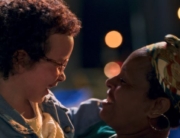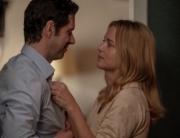Something is in the water in France. First, we get the literal auto-erotica of Titane and now we have Bloody Oranges, which starts off like a Frenchified Armando Iannucci film and ends up as an homage to The Silence of the Lambs. In short, it is cynical, brutal, and drolly and darkly funny.
The movie begins with judges at a dance competition bickering over whether a dancer who has limp is actually disabled, and eventually it descends to fighting over if those with Down syndrome are able to dance well. So, right at the start, any attempt at political correctness is launched out the window.
Then we meet Alexandre (Alexandre Steiger), a neurotic self-obsessed lawyer who is the son of Olivier (Olivier Saladin) and Laurence (Lorella Cravotta). His parents are deeply, stupidly in debt and firmly believe that when they win the above-mentioned dance competition, they will be able to pay off all debts. Meanwhile, Alexandre gets sucked into a scheme to make an embarrassing story about France’s finance minister, Stéphane (a wonderfully smarmy Christophe Paou), go away: Stephane has hidden a large sum of money to avoid paying taxes, and it seems some nosy journalists are circling. Then there is Louise (Lilith Grasmug), a virginal 16-year-old we meet at a gynecologist’s office discussing so frankly the sex she is preparing to have it would have given the Moral Majority apoplexy. All these disparate characters end up intertwining in surprising ways. However, one disadvantage of the storytelling is that it takes a while for the plot and shape of the film to kick in. You are not quite sure what you are watching until about halfway.
The template is a combination of Veep and hyper-verbal Robert Altman. There are many gatherings, personal and professional, where characters are aggressively talking over each other, bickering, scoring points, and pointedly not listening to each other. There’s not that much love in these sequences, or in the movie, though some empathy seeps through. The characters are herded either toward predator and prey. This is metaphorical in the former and quite literal in the latter, and the change of tone to a more violent, existential truth is harsh.
Halfway through, a new character appears, a smoking jacket-wearing gentleman (Fred Blin) who is watching the financial news on TV and feeding shrimp to a fully grown boar with chopsticks. He becomes the chaos agent of Bloody Oranges, and the damage he inflicts is maximal. He is Buffalo Bill and Hannibal Lector combined. The character isn’t even given a name, but he calls himself a monster—“society made me that way.” Even as the movie switches gears to depict actions far more physically brutal than what we’ve previously seen, it still manages to keep its sense of humor and feels of a piece, which is a feat. After dragging viewers through the darkness, the final confrontation offers the one thing the characters lack: empathy and ultimately connection.
And this is what director and co-writer Jean-Christophe Meurisse seems to be saying. We are detached from each other in such a profound way that it takes shocking brutality or profound humiliation to actually make us acknowledge each other’s humanity, and the main undercurrent of this detachment is money. Stéphane is the finance minister, Olivier and Laurance are under an impossible amount of debt, and while viewers have sympathy for them, nobody else really does. When Alexandre and his brother needle each other over their wealth and status, it’s just another wall that keeps the brothers from seeing each other.
Bloody Oranges is nothing close to an easy film to watch. It is quite sardonically funny, but it is challenging, violent, gruesome, and maybe even necessary.







Leave A Comment